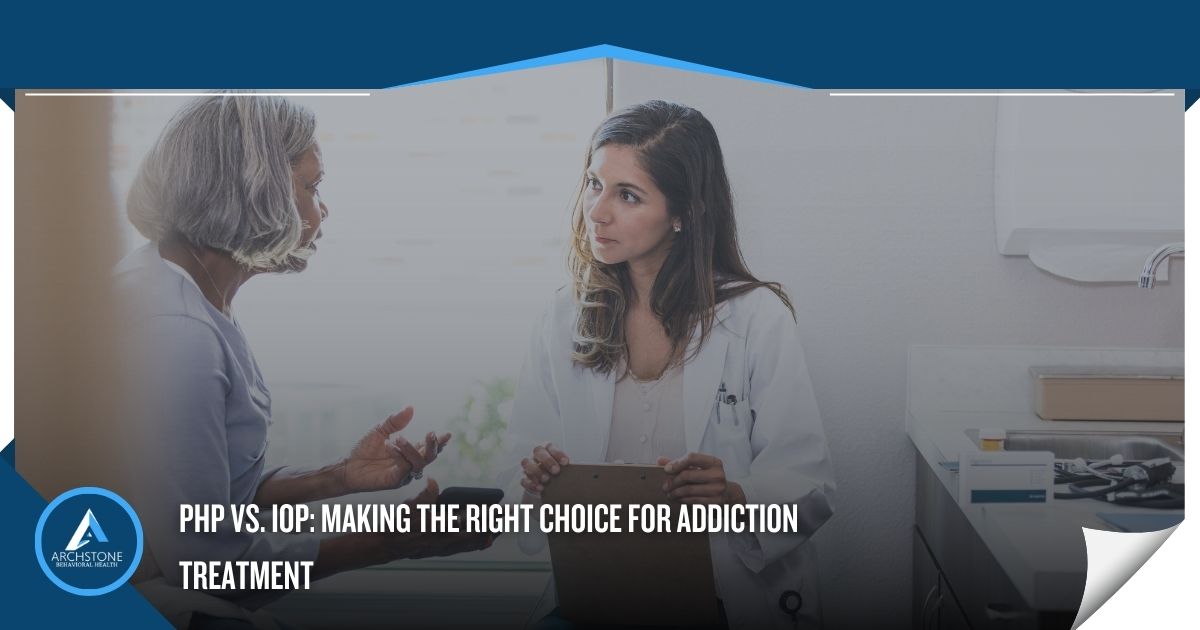PHP vs. IOP: Making the Right Choice for Addiction Treatment
Get Help Now
If you are one of millions of people in the US living with substance abuse or addiction, you probably know the impact these conditions can have on every part of your life. When you struggle with drug and alcohol abuse, your relationships, health, and functioning can suffer.
Addiction treatment can give you the care, support, and tools you need to put substance abuse in the past. Recovering from addiction is not a one-size-fits-all process. Each person has different needs and requires tailored care.
There are several levels of care in addiction treatment. Two common outpatient levels of care are partial hospitalization programs (PHP) and intensive outpatient programs (IOP). While these treatment options are both outpatient levels of care, they offer different types of support.
Learning about the differences between PHP vs. IOP can help you make the best choice for your care. This article will outline partial hospitalization programs and intensive outpatient treatment options.
Contact the Archstone Behavioral Health team now to learn more about these and other treatment programs. You can also verify your insurance, ask questions, or schedule an intake evaluation.
Intensive Outpatient Programs (IOP): An Overview
An intensive outpatient program (IOP) is a type of outpatient addiction treatment. In many cases, people may attend an IOP after completing an inpatient program or a higher level of care.
Participating in an IOP can give you the support and treatment you need to stay on track with your recovery. People in an IOP typically attend treatment sessions several hours per day, three to five days per week.
An IOP treatment plan may include:
- Individual counseling
- Behavioral therapies, including cognitive behavioral therapy (CBT)
- Group therapy
- Family therapy
- Relapse prevention education
- Coping skills practice
- Aftercare planning
- Holistic treatments, including exercise, mindfulness, yoga, and more
While receiving care in an IOP, you will have consistent access to mental health and medical care. You may be able to balance your treatment sessions with work, caring for family members, or attending school.
Many people benefit from the support of an IOP. However, an intensive outpatient program may not be right for everyone.
A doctor or addiction specialist may recommend an IOP to people who meet specific criteria, including:
- Those who are not in active withdrawal
- People who do not have frequent or intense cravings
- Those who do not require 24/7 supervision
- People who are mentally and medically stable
An IOP may be a good fit if you need significant support to stay on track in recovery but do not require round-the-clock care.
Partial Hospitalization Programs (PHP): An Overview
A partial hospitalization program (PHP) is an intensive level of addiction treatment. Medical and mental health practitioners structure a PHP to provide support similar to inpatient treatment. However, people in a PHP do not live in the treatment center.
Partial hospitalization programs follow a rigorous schedule of treatments. People in a PHP typically spend 5-6 hours in treatment sessions five days a week.
Treatment in a PHP may include:
- Individual psychotherapy
- Behavioral therapies, including cognitive behavioral therapy (CBT) and dialectical behavioral therapy (DBT)
- Medication management
- Behavioral health screenings and treatment
- Relapse prevention education
- Family therapy
- Holistic therapies, including nutrition support, exercise, mindfulness, art therapy, and more
The intensive schedule of a PHP may prevent people from working, attending school, or taking care of family members as usual. However, people in a PHP have some flexibility to engage in hobbies and spend time with their friends and families.
A partial hospitalization program is the most intensive form of outpatient care. People may transition from a residential program into a PHP. Some may begin their treatment in a partial program.
Doctors and addiction specialists typically recommend people attend a PHP if they meet specific criteria. A PHP may be best for people who:
- Have completed an inpatient or residential treatment program
- Require significant support to avoid relapse
- Have not been able to maintain sobriety in lower levels of care
- Have co-occurring mental health disorders
- Need substantial mental health or medical treatment during rehab
- Do not feel confident that they can manage triggers or avoid relapse
A partial hospitalization program requires a significant commitment of time. However, the high-quality, intensive treatment you will receive can help you build a solid foundation of skills and support that can help you put addiction in the past.
PHP vs. IOP: Which is Right For Me?
Before starting treatment, a doctor or addiction specialist will assess your needs and recommend a level of care. This evaluation will include questions about your substance use, family history of addiction, health history, and more.
If you or someone you love needs addiction treatment, you are not alone. Contact the team at Archstone Behavioral Health now to learn about our supportive rehab programs. You may also verify your insurance coverage or schedule an intake assessment.
